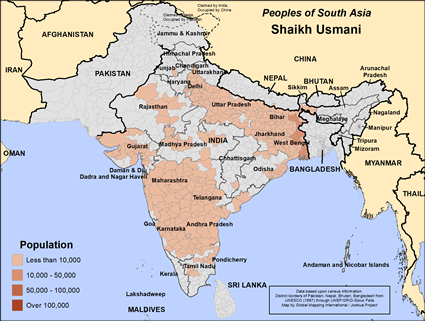Shaikh Usmani in India

Photo Source:
Rehan Ahmed Usmani - Wikimedia
Creative Commons
|

Map Source:
People Group data: Omid. Map geography: UNESCO / GMI. Map Design: Joshua Project
|
| People Name: | Shaikh Usmani |
| Country: | India |
| 10/40 Window: | Yes |
| Population: | 487,000 |
| World Population: | 487,000 |
| Primary Language: | Urdu |
| Primary Religion: | Islam |
| Christian Adherents: | 0.00 % |
| Evangelicals: | 0.00 % |
| Scripture: | Complete Bible |
| Ministry Resources: | Yes |
| Jesus Film: | Yes |
| Audio Recordings: | Yes |
| People Cluster: | South Asia Muslim - Shaikh |
| Affinity Bloc: | South Asian Peoples |
| Progress Level: |
|
Introduction / History
The term Shaikh is used for a sociocultural group that originated with Arab settlers in South Asia which now includes many subgroups including the Usmani. Islam arrived in the area now known as Pakistan in 711 AD when a Muslim Arab army conquered the northwestern part of the Indus Valley from Jammu and Kashmir to the Arabian Sea. Technocrats, bureaucrats, soldiers, traders, scientists, architects, teachers, theologians, and Sufis flocked from the rest of the Arab and Muslim world to the Islamic Sultanate in South Asia and settled permanently. The descendants of these Arabs usually go by the title of Shaikh and are also known in Pakistan as Muslim Khatri. They are a sub-group of the Zamindar group traditionally associated with farming.
Shaikh is also a term that is usually attributed to the leaders or elders of Arabian social groups. After the advent of Islam in South Asia, some high caste (Brahmins, Muslim Rajputs and Khatris) converted to Islam in the Punjab region and adopted the Shaikh title. They are known as Punjabi Shaikh.
There are a couple of Shaikh subgroups, including the Usmani, the Faruqi and the Qureshi. You can tell which group they are from by their surname. The Usmani Shaikhs are scattered throughout India.
What Are Their Lives Like?
The large south Asian caste of Shaikhs is not bound by one particular profession. The Shaikh can be broadly grouped into five communities. The majority of the Punjabi Shaikhs are urbanized and detached from their traditional agricultural ancestry. However, a few families still cultivate their own land in the western districts of Punjab. The main professions of the urban Punjabi Shaikhs are business and public service. They are often stereotyped for their business acumen.
Usmani Shaikhs marry within their group. Families arrange marriages. Marriage to one spouse is the norm but a man may marry more wives if he can afford them. Sons inherit property. As Muslims, they will not eat pork.
What Are Their Beliefs?
Usmani Shaikhs profess Islam and have both Sunni and Shia traditions among them. Both groups try to obey the teachings of the Koran and the prophet Mohammad. They believe that by following the Five Pillars of Islam that they will attain heaven when they die. However, Allah, the supreme God of the universe, determines who enters paradise. Sunnis pray five times a day facing Mecca. They fast the month of Ramadan. They attend mosque services on Friday. If a Muslim has the means, he or she will make a pilgrimage to Mecca once in his or her lifetime. Muslims are also prohibited from drinking alcohol, eating pork, gambling, stealing, deceiving, slandering, and making idols. The two main holidays for Sunni Muslims are Eid al Fitr, the breaking of the monthly fast and Eid al Adha, the celebration of Abraham's willingness to sacrifice his son to Allah.
What Are Their Needs?
There has been much ministry activity among the Shaikh in India. Unfortunately, these efforts have brought few Shaikh into God's kingdom. Shaikhs who live in rural villages often lack access to modern medicine, electricity and clean water. Teams of believers can help meet these needs.
Prayer Points
Ask the Lord to open the hearts of the Usmani Shaikhs so they will receive the good news.
Pray for a disciple making movement that will bless the Usmani Shaikhs.
Pray for the Lord to send loving workers to the Usmani Shaikhs to tell them about the King of kings.
Pray for dreams and visions to lead this people group to the King of kings.